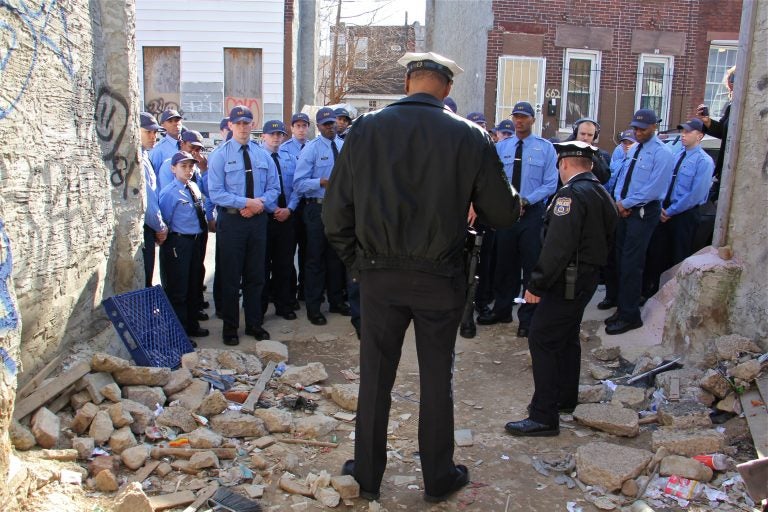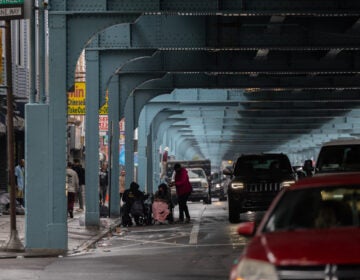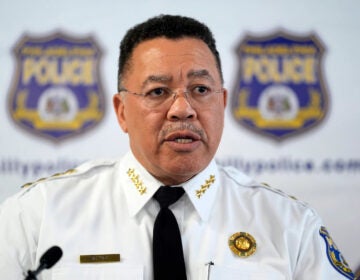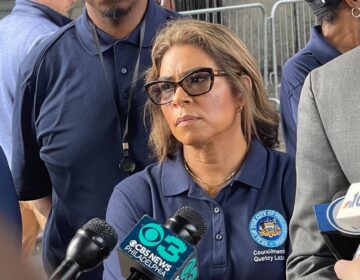Philadelphia police recruits get up-close tour of Kensington neighborhood
The Philadelphia Police Academy’s new class visited the epicenter of the city’s opioid crisis. Officers told them to be open to unconventional solutions.
Listen 2:02
A group of Philadelphia police cadets touring Kensington, gather at a vacant lot on East Lippincott Street where their instructors show them signs that heroin is being used there. (Emma Lee/WHYY)
Captains Stephen Clark and Javier Rodriguez led a procession of about 40 fresh-faced young men and women in crisp light-blue shirts down Kensington Avenue. Their charges wore caps emblazoned with “387,” the number assigned to the class of 75 recruits who will graduate March 1 from the Philadelphia Police Academy.
But before they graduated, the recruits would complete this rite of passage: walking the streets of a Philadelphia neighborhood to get a closer look at conditions in the city they will be sworn to protect. Police leaders brought this class to Kensington, the epicenter of the city’s opioid crisis, and an area receiving renewed attention since Mayor Jim Kenney’s declaration of an emergency there last fall.
The recruits walked past the shuttered storefronts of the once-vibrant commercial corridor near Allegheny Avenue. They stopped outside McPherson Square Library, where librarians rescue drug users who overdose in the park outside, and Prevention Point Philadelphia, the needle-exchange and harm-reduction organization that provides housing, health care, and treatment to a multitude who are homeless and addicted to opioids.
Captain Clark, commander of the local precinct, told the future officers that the crisis had gotten so bad that Prevention Point sometimes had “people piling up outside the door.”
“Some of the community likes the role that they play, some don’t,” Clark said as the recruits huddled around him in a semicircle. “But what we’ve learned is they’ve become a very important partner.”
Police in Kensington’s 24th District have recently begun teaming up with Prevention Point on a new diversion program that gives people caught for low-level drug offenses the option of receiving social and behavioral-health services instead of being prosecuted in court.
It’s one of the solutions put forward by the Kenney administration’s Philadelphia Resilience Project, a multi-agency strategy for battling the opioid crisis.
Clark told the recruits their youth would help them adopt solutions that require them to think outside the box of traditional police work.
“You guys have grown up with continual change,” he said. “You are the solution to this.”
Captain Rodriguez, who commands the neighboring 25th District, said the future officers would have to put their personal feelings about addiction aside as they supported new initiatives ordered by city officials.
“If you believe that it’s a personal choice, or whether you believe that it’s a disease and a person’s suffering through it, the point is that we have a problem here, and we have to enact whatever solution they come up with,” he said.
But as he stepped over a discarded syringe, Rodriguez said the ultimate goal wasn’t to show more compassion for drug users, but to protect the “true victim” of the Kensington crisis: the elderly residents, children, and families exposed to the trauma and violence it begets.
The group circled back to a white school bus waiting for the recruits on Allegheny Avenue, making a final stop on a small side street the officers described as a hub for drug dealing. At a vacant lot shadowed by the high walls of neighboring row houses, Clark pointed out litter from the drug trade: hundreds of rubber bands that hold together “bundles” of heroin, and torn pieces of the white paper that wraps the bundles into larger “racks.” Closing off vacant lots like this one on a difficult block to watch was another priority of the Resilience Project, Clark said.
Stephen Hunsberger, a 24-year-old recruit from Bucks County, said seeing the needles littering parks and streets was “eye-opening.” He said he thought arresting more drug dealers would help.
“If you can get them out of here, that would help drive the crime and everything out,” Hunsberger said.
But Maria Athanasiadis, 25, a recruit from South Kensington, said she wasn’t shocked by what she saw. She said a police officer’s main job should be to help children and families caught in the middle of the drug crisis, but that it wouldn’t be difficult for her to lend a helping hand to people who were addicted as well.
Growing up in the city, Athanasiadis said, she knew people whose lives had been devastated by drugs.
“You learn to be compassionate, rather than judgmental,” she said.
WHYY is your source for fact-based, in-depth journalism and information. As a nonprofit organization, we rely on financial support from readers like you. Please give today.





